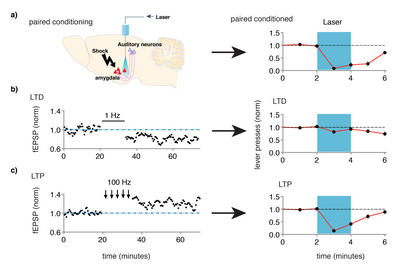The Nabavi group is focusing on how plasticity at the synaptic and circuit levels in the brain relates to behavioral plasticity (learning and memory formation) and how the newly formed memories are integrated into the existing network (cellular and systems consolidation) using rodents as model organism.
The idea that changes in synaptic strength (synaptic plasticity) is the foundation of memory and learning has a long history. For this reason long term potentiation (LTP) and long term depression (LTD), the electrophysiological manifestations of synaptic plasticity, have been intensely studied. However, the proof of causality, that by changing synaptic strength one can remove and reinstate a memory, had been missing.
In our recent paper we provided the most direct evidence showing a cause-effect relation between synaptic plasticity and memory formation (Nabavi et al., 2014, Nature). With the use of optogenetics fortified by in vitro/in vivo recording and behavioral assays we generated an associative memory and showed that we could repeatedly turn off and on this associative memory simply by inducing LTD and LTP (see the figure).
An immediate question following this study is how these newly formed memories are integrated into the existing network. This is a vital concern for any system that aims to store and retrieve information. Our brain is continuously exposed to external sensory inputs. This amount of information can overwhelm any storage device no matter how large its capacity. Therefore, a challenge for our brain is to decide which information is worthy of permanent storage. The storage process itself, however, poses another challenge: how to integrate new information into a network of pre-existing memories without “catastrophic interference” (forgetting).
The first challenge is commonly known as synaptic consolidation, which takes place within the first minutes to hours after memory formation. The second challenge, known as systems consolidation, is a slower process that takes weeks, months or even years. The major focus of my research is to understand how our brain tackles these challenges. To this end we will use a combination of tools such as molecular biology, in vitro and in vivo electrophysiology, two-photon laser scanning microscopy, optogenetics, behavioral analysis (i.e. whatever it takes) to move forward.
These studies may lead us to better understand and treat better neuropsychological diseases thought to be related to aberrations in synaptic plasticity, such as posttraumatic stress disorder, schizophrenia, substance abuse disorders and dementia.
